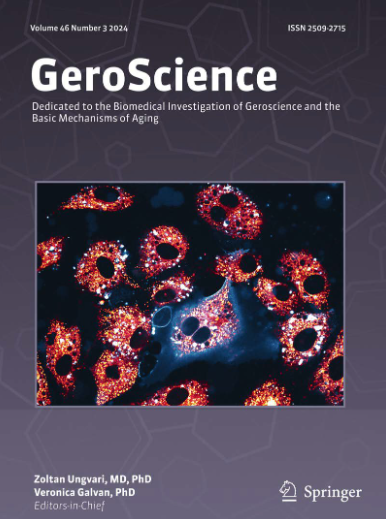维生素D缺乏是50岁及以上人群认知能力下降的危险因素。
IF 5.3
2区 医学
Q1 GERIATRICS & GERONTOLOGY
引用次数: 0
摘要
关于维生素D缺乏对老年人认知能力的影响,纵向研究提供了相互矛盾的证据。目前的研究旨在调查维生素D缺乏是否是全球认知和特定认知领域较差轨迹的风险因素,为期六年的随访期。这项队列研究分析了2625名年龄在50岁及以上的英国老龄化纵向研究参与者的数据。维生素D[25-羟基维生素D, 25(OH)D]被分为充足(> 75 nmol/L)、不足(> 30和≤75 nmol/L)和缺乏(≤30 nmol/L)。认知表现采用语言流畅性测试、单词列表测试、时间取向测试和整体认知测试进行评估,并按年龄组和教育水平采用z分数进行标准化。广义线性混合模型,调整了社会人口、行为和临床变量,估计了基于维生素D状态的全球认知和认知领域的下降率。维生素D缺乏症的参与者整体认知的z分数下降更大(每年- 0.037标准差(SD);95% CI: - 0.069至- 0.005)和执行功能(- 0.038 SD /年;95% CI: - 0.071至- 0.004),与维生素D水平充足的人相比。在与维生素D状态相关的记忆轨迹或时间取向方面没有观察到显著差异。维生素D缺乏是50岁及以上人群全球认知和执行功能下降的一个危险因素。维生素D水平的评估和管理可能是促进认知健康的关键策略。本文章由计算机程序翻译,如有差异,请以英文原文为准。
Vitamin D deficiency as a risk factor for cognitive decline in individuals aged 50 or older.
Longitudinal studies provide conflicting evidence regarding the impact of vitamin D deficiency on cognitive performance in older individuals. The present study aimed to investigate whether vitamin D deficiency is a risk factor for poorer trajectories in global cognition and specific cognitive domains over a six-year follow-up period. This cohort study analysed data from 2625 participants aged 50 years or older from the English Longitudinal Study of Ageing. Vitamin D [25-hydroxyvitamin D, 25(OH)D] was classified as sufficient (> 75 nmol/L), insufficient (> 30 and ≤ 75 nmol/L), or deficient (≤ 30 nmol/L). Cognitive performance was assessed using the verbal fluency test, word list test, temporal orientation test, and global cognition, standardised in z-scores by age group and educational level. Generalised linear mixed models, adjusted for sociodemographic, behavioural, and clinical variables, estimated rates of decline in global cognition and cognitive domains based on vitamin D status. Participants with vitamin D deficiency showed greater declines in the z-score of global cognition (- 0.037 standard deviations (SD) per year; 95% CI: - 0.069 to - 0.005) and executive function (- 0.038 SD per year; 95% CI: - 0.071 to - 0.004) compared to those with sufficient vitamin D levels. No significant differences were observed in the trajectories of memory or temporal orientation in relation to vitamin D status. Vitamin D deficiency is a risk factor for declines in global cognition and executive function in individuals aged 50 or older. The assessment and management of vitamin D levels may be crucial strategies for promoting cognitive health.
求助全文
通过发布文献求助,成功后即可免费获取论文全文。
去求助
来源期刊

GeroScience
Medicine-Complementary and Alternative Medicine
CiteScore
10.50
自引率
5.40%
发文量
182
期刊介绍:
GeroScience is a bi-monthly, international, peer-reviewed journal that publishes articles related to research in the biology of aging and research on biomedical applications that impact aging. The scope of articles to be considered include evolutionary biology, biophysics, genetics, genomics, proteomics, molecular biology, cell biology, biochemistry, endocrinology, immunology, physiology, pharmacology, neuroscience, and psychology.
 求助内容:
求助内容: 应助结果提醒方式:
应助结果提醒方式:


